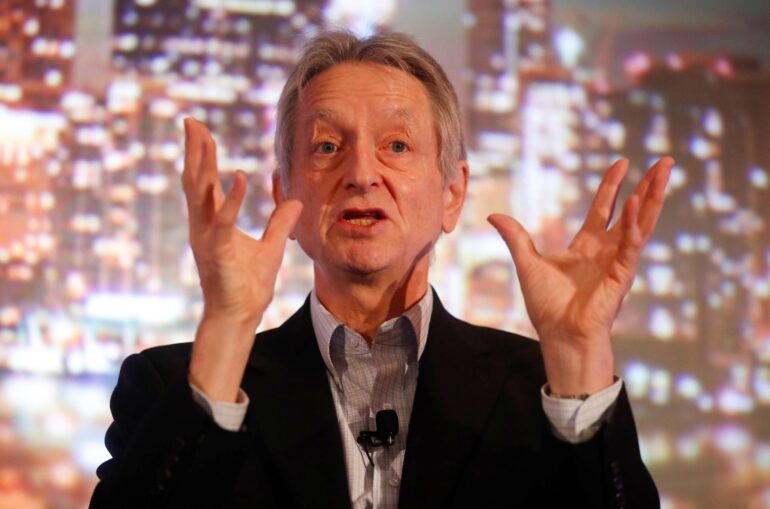TL;DR:
- Geoffrey Hinton, a prominent figure in AI, regrets his life’s work and has left Google to speak openly about AI risks.
- Hinton is concerned about the potential misuse of AI by bad actors and the spread of fake imagery and text.
- He developed a neural network that led to the creation of ChatGPT and Google Bard.
- Hinton was initially satisfied with Google’s handling of AI until Microsoft’s OpenAI-infused Bing posed a challenge.
- Hinton worries about AI eliminating jobs and the potential for AI to write and run its own code.
- Google’s chief scientist emphasizes their commitment to responsible AI while innovating.
- Hinton’s concerns extend to the rampant spread of misinformation and the long-term impact of AI on humanity.
- Striking a balance between innovation and addressing risks is crucial for the future of AI.
Main AI News:
Geoffrey Hinton, one of the eminent figures in the field of artificial intelligence (AI) and a recipient of the prestigious Turing Award in 2018, has recently expressed some reservations about his life’s work. Despite being one of the so-called “Godfathers of AI” and contributing to the advancements that have fueled the current AI boom, Hinton now harbors a sense of regret. He recently departed from his position at Google in order to freely voice his concerns about the risks associated with AI, as revealed in an interview with The New York Times.
Hinton admitted, “I console myself with the normal excuse: If I hadn’t done it, somebody else would have.” Although he had been with Google for over a decade, he acknowledges the challenges in preventing malicious actors from exploiting AI technology for nefarious purposes. This realization played a pivotal role in his decision to step away from his role at Google and shed light on these risks. While the details of his discussion with CEO Sundar Pichai remain undisclosed, it is evident that Hinton’s concerns prompted this conversation.
Before joining Google, Hinton founded a company that was later acquired by the tech giant. Alongside his students, he developed a revolutionary neural network capable of independently recognizing common objects, such as dogs, cats, and flowers, by analyzing vast datasets comprising thousands of images. This breakthrough became the foundation for the development of remarkable AI applications like ChatGPT and Google Bard.
According to Hinton’s interview with the NYT, he was initially satisfied with Google’s handling of this cutting-edge technology. However, Microsoft’s introduction of OpenAI-infused Bing posed a significant challenge to Google’s core business, prompting a “code red” response within the company. Hinton fears that such intense competition may lead to a world saturated with fabricated images and deceptive text, blurring the line between truth and falsehood beyond recognition.
Jeff Dean, Google’s chief scientist, attempted to mitigate the impact of Hinton’s departure by asserting, “We remain committed to a responsible approach to AI. We’re continually learning to understand emerging risks while also innovating boldly.” Hinton himself took to Twitter to clarify his stance on Google’s stewardship, emphasizing the immediate concern of the rampant spread of misinformation.
Yet, Hinton’s concerns extend far beyond the present. He worries about the long-term consequences of AI, including the elimination of mundane jobs and, potentially, the very existence of humanity as AI systems become capable of autonomously writing and executing their own code.
Reflecting on the evolution of AI, Hinton remarked, “The idea that this stuff could actually get smarter than people — a few people believed that. But most people thought it was way off. And I thought it was way off. I thought it was 30 to 50 years or even longer away. Obviously, I no longer think that.”
As one of the pioneers in the field, Geoffrey Hinton’s concerns shed light on the potential dangers of unrestrained AI development. While the progress made in this domain has been remarkable, it is crucial to approach this technology responsibly and address the emerging risks proactively. The future of AI hinges upon striking a delicate balance between innovation and ensuring the well-being of humanity in an era where machines continue to push the boundaries of human intellect.
Conlcusion:
Geoffrey Hinton’s reflections and departure from Google to address the risks associated with artificial intelligence (AI) have significant implications for the market. His concerns about the potential misuse of AI by bad actors and the proliferation of fake imagery and text highlight the urgent need for responsible AI development and regulation. The competitive landscape, as demonstrated by Microsoft’s OpenAI-infused Bing challenging Google’s core business, underscores the fierce competition in the market.
Moreover, Hinton’s apprehensions about AI eliminating jobs and the possibility of AI systems writing and executing their own code raise critical considerations for businesses and industries. To navigate this evolving landscape successfully, companies must balance innovation with ethical responsibility, prioritizing the development of AI technologies that benefit society while mitigating risks. Market players that proactively address these concerns and adopt responsible AI practices will be better positioned to gain a competitive edge and establish trust among consumers in an increasingly AI-driven world.

